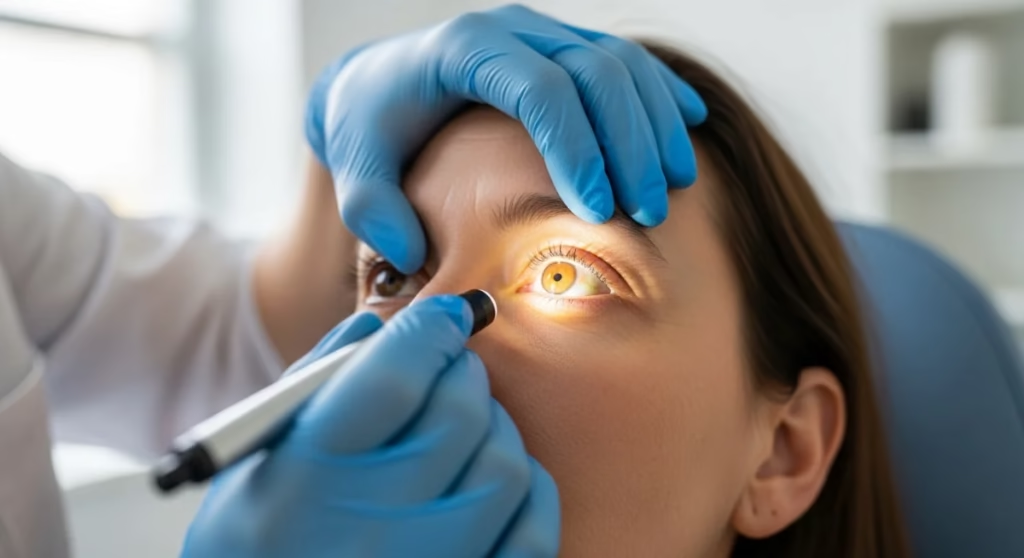Introduction
Yellowing of the eyes is medically referred to as scleral jaundice, which occurs when the white part of the eyes takes on a yellow hue. This condition is often linked to elevated bilirubin levels, a pigment produced during the breakdown of red blood cells. While mild or temporary yellowing can sometimes be harmless, persistent discoloration may indicate underlying health issues.
Understanding the causes, symptoms, and treatment options is essential to protecting your liver, gallbladder, and overall well-being. This guide provides a comprehensive look at yellow eyes, how they occur, and the steps you can take for prevention and care.
What Causes Yellow Eyes?
Yellow eyes usually arise from a buildup of bilirubin in the bloodstream. The liver plays a crucial role in processing this pigment, so any disruption in liver function can lead to discoloration. Common causes include:
1. Liver Disorders
The liver filters toxins and processes bilirubin. Conditions affecting the liver can cause jaundice:
- Hepatitis (A, B, C): Viral infections causing liver inflammation.
- Cirrhosis: Scarring of the liver due to long-term damage, often from alcohol or fatty liver disease.
- Liver cancer: Malignant growths can disrupt normal liver function.
2. Gallbladder and Bile Duct Issues
Bile ducts transport bile and bilirubin from the liver to the intestines. Obstructions can lead to yellowing of the eyes:
- Gallstones blocking bile flow
- Bile duct inflammation
- Tumors pressing on bile ducts
3. Hemolytic Conditions
Certain blood disorders increase the breakdown of red blood cells, raising bilirubin levels:
- Hemolytic anemia
- Sickle cell disease
- Reactions to specific medications
4. Newborn Jaundice
In infants, yellow eyes are common due to immature liver function. This type of jaundice usually resolves within a few weeks, though severe cases may require treatment.
5. Medication or Toxin Effects
Some drugs and toxins impact liver function or red blood cells:
- High doses of acetaminophen
- Certain antibiotics like rifampin
- Alcohol and recreational substances
Recognizing the Symptoms
Yellow eyes rarely appear in isolation. Look for accompanying signs that may indicate a serious problem:
- Yellowing of the skin (jaundice)
- Dark, tea-colored urine
- Pale or clay-colored stools
- Itchy skin
- Fatigue, nausea, or abdominal pain
- Fever or unexplained weight loss
Persistent symptoms require prompt medical evaluation.
How Doctors Diagnose Yellow Eyes
Healthcare providers use several methods to identify the cause of yellowing:
- Physical Examination – Observing the sclera and skin.
- Blood Tests – Checking bilirubin levels, liver enzymes (AST, ALT), and complete blood counts.
- Imaging Studies – Ultrasounds, CT scans, or MRIs to examine liver, gallbladder, and bile ducts.
- Specialized Tests – Hepatitis panels, autoimmune liver tests, or liver biopsy for complex cases.
Early diagnosis is essential to prevent complications.
Treatment Options
Treatment depends on the underlying cause of yellowing.
1. Treating Liver Conditions
- Hepatitis: Antiviral medications, lifestyle adjustments, and supportive care.
- Cirrhosis: Symptom management, dietary changes, and avoiding liver toxins.
- Liver cancer: Surgery, chemotherapy, or transplantation depending on severity.
2. Addressing Gallbladder or Bile Duct Problems
- Surgical removal of gallstones or bile duct repair may be necessary.
- Minimally invasive procedures can relieve obstruction and restore bile flow.
3. Lifestyle and Home Care
- Avoid alcohol and liver-toxic medications.
- Eat a liver-friendly diet rich in fruits, vegetables, whole grains, and lean protein.
- Stay hydrated and maintain a healthy weight.
4. Medications
Depending on the cause, prescription drugs may address infections, inflammation, or autoimmune liver disorders.
5. Surgery or Advanced Procedures
Severe cases may require liver transplantation or corrective bile duct surgery.
Preventing Yellow Eyes
Preventive measures help reduce the risk of jaundice and maintain overall liver health:
- Regular medical checkups to monitor liver and blood health.
- Vaccination against hepatitis A and B.
- Limiting alcohol consumption.
- Avoiding unnecessary medications.
- Maintaining a balanced, nutrient-rich diet.
Dietary Support for Liver Function
Nutrition plays a vital role in maintaining healthy bilirubin levels and liver function. Include:
- Leafy greens: Spinach, kale, lettuce
- Fruits: Citrus fruits, berries, and apples
- Whole grains: Brown rice, oats, barley
- Lean protein: Fish, chicken, legumes
- Healthy fats: Olive oil, avocado, and nuts
Avoid processed foods, sugary drinks, and excessive alcohol.
Complications if Left Untreated
If the underlying cause of yellow eyes is ignored, serious complications can arise:
- Chronic liver failure
- Gallbladder infections
- Liver cancer progression
- Blood disorders worsening
Timely intervention can prevent these outcomes.
Lifestyle Tips for Liver and Eye Health
- Stay hydrated and exercise regularly.
- Maintain a healthy body weight.
- Limit exposure to environmental toxins.
- Avoid self-medicating with over-the-counter drugs.
- Manage chronic conditions such as diabetes or high blood pressure.
When to Seek Medical Help
Consult a healthcare professional if you notice:
- Rapid yellowing of eyes or skin
- Abdominal pain or swelling
- Persistent fatigue or unexplained weight loss
- Dark urine and pale stools
Prompt medical attention ensures proper treatment and prevents progression.
FAQ About Yellow Eyes
Q1: Can yellow eyes be harmless?
Yes, temporary yellowing can occur after strenuous exercise or in mild, self-limiting cases. Persistent yellowing requires evaluation.
Q2: How long does it take to recover?
Recovery depends on the cause. Mild jaundice may resolve in days, while liver or gallbladder conditions may take weeks or longer.
Q3: Can medications cause yellow eyes?
Certain drugs, such as antibiotics or high-dose acetaminophen, can lead to jaundice. Always consult a doctor.
Q4: Is yellowing reversible?
Often, yes. Treating the underlying condition and supporting liver health usually restores normal eye color.
Q5: Can diet help prevent yellow eyes?
Yes. Eating a liver-friendly diet, avoiding alcohol, and staying hydrated supports liver function and bilirubin metabolism.
Conclusion
Yellow eyes are a visible warning sign that should never be ignored. They can indicate liver, gallbladder, or blood-related health issues. Recognizing the early symptoms, seeking medical evaluation, and adopting a liver-friendly lifestyle are key to recovery and long-term wellness.
By combining medical care, proper nutrition, and preventive habits, individuals can reduce the risk of serious complications and maintain healthy, clear eyes.







